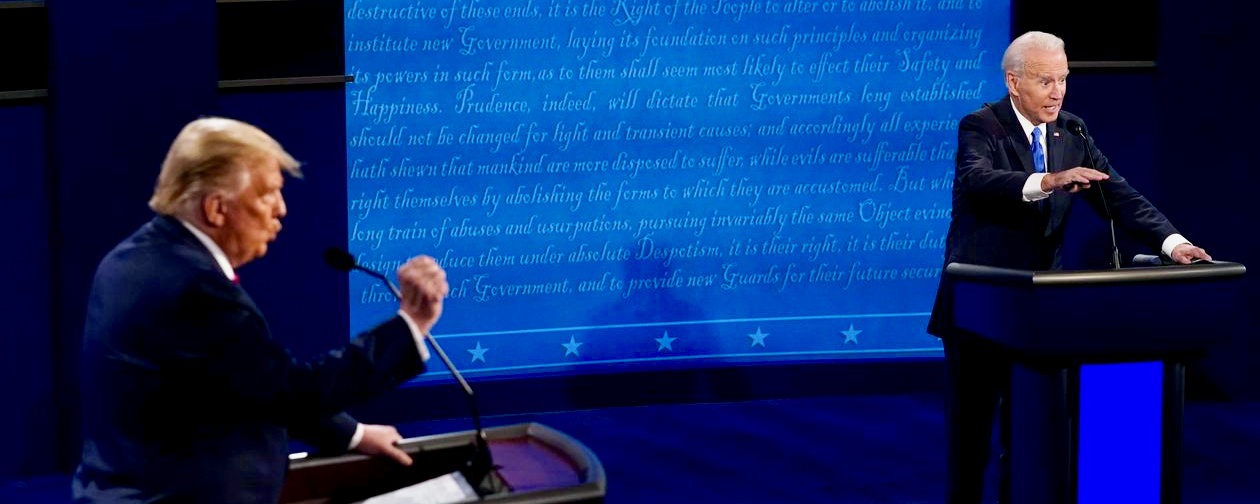What is the Future of Healthcare Policy?
NB: This is the first in a planned series of posts about healthcare reform. I’ll continue my general political posts, particularly about political reform, as well.
In last week’s presidential debate, former Vice President Biden said that he would not only work to preserve the Affordable Care Act (ACA), also known as “Obamacare”, but to expand it, as “Bidencare”. In contrast, President Trump said he would like to terminate Obamacare and replace it with “a brand new, beautiful, healthcare”.
But, wishing doesn’t make it so, does it, Mr. Trump? You and other Republican candidates won office with pledges to “Repeal and Replace”. You then had two years with GOP control of both the House and Senate, but no passable legislation was offered to accomplish either repeal or replacement of the ACA. The most the Republican-led Congress could manage was to eliminate the penalty for violating the individual mandate portion of the ACA, which required that everyone have healthcare insurance or pay a fine.
Elected Republicans seem unable to remember that the origins of the ACA can be found in GOP ideas. Way back in 1993, when the Clinton administration took on an ill-fated mission of comprehensive healthcare reform, “Hillarycare”, some GOP senators countered with a plan that was in many ways predictive of the ACA to come, to include the provision of an individual mandate.. And, in 2006, Massachusetts passed healthcare reform while current GOP Senator Mitt Romney was Governor. “Romneycare” was a more contemporary model for what would become the ACA.
President Trump and Congressional Republicans will continue to lambast Biden’s plans as “socialized medicine” and the “government takeover of our healthcare system”. But, the truth is, much of our current healthcare system has already been taken over by government and is therefore “socialized”. In 2019, our total spending on healthcare was $3.6 trillion, of which $1.7 trillion was subsidized, directly or indirectly, by government.

As for “Bidencare”, the most ambitions aspect of this proposal is the provision of a “public option” for those who feel they are not well-served by their current insurer. From Biden’s website, this would be a “public health insurance option like Medicare”. So, presumedly not necessarily identical to Medicare, but similar.
One can see the influence of former South Bend Mayor Pete Buttigieg here. Mayor Pete was a consistent advocate of a “public option” when he was campaigning for the Democratic presidential nomination, in contrast to the calls for “Medicare for All” by the likes of Senator Bernie Sanders and almost all of his fellow competitors. Buttigieg and has since become a close advisor to the Biden/Harris campaign.
Two other areas of expansion under “Bidencare” are less ambitious, but still potentially impactful. One would increase “tax credits to lower premiums and (thereby) extend coverage”, and the other would be to offer “premium-free access to the public option” for those living in the 14 states that would otherwise be eligible for Medicaid expansion under the ACA, but whose states have refused to expand such eligibility.

Despite posturing by Trump and his GOP Congressional allies, the truth is that Biden is not an extreme progressive, but a center-left Democrat. He has a 47 year history of sometimes problematic public service which proves this point, from his support of the 1994 Crime Bill to his friendship with segregationist Senator Strom Thurmond, and even his pick of former Attorney General and current Senator, Kamala Harris as his running mate.
Biden’s proposal to expand “Obamacare” as “Bidencare” reflects this history. It’s an incremental, not a radical, approach. Generally, I think that’s a good thing, but in this case, it is incremental change going in the wrong direction. While “Obamacare” had a few good elements, and has become fairly popular with the public, its fundamental flaw was that it mostly just expanded an already seriously defective healthcare system, while largely protecting the “healthcare industrial complex”. Biden’s plan, if realized, will do more of the same.
As a physician for over 30 years, I can tell you without hesitation or equivocation that our healthcare system is in dire need of real reform. Our status quo has failed us, and will continue to do so. “Obamacare”, was largely an extension of that status quo, and so will be “Bidencare”. I’m not a fan of “Medicare for All”, either. I think we can find a better way, an American way, that values ideals such as transparency, competition, and fairness. I believe we can create a more vibrant healthcare system; one which delivers better results, is much less costly, and ensures that no American is left behind.
We may have to wait a couple of election cycles to begin to realize such a dream, but in the meantime, I look forward to sharing my thoughts with you going forward.
